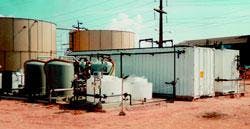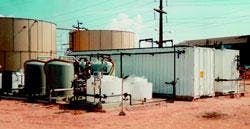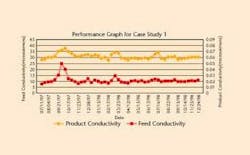Multiple membrane system reduces chemical use in Brazilian power plant
By Jaime Staton and Rolando Piaia
Industry needs demineralised water for steam and process water. Traditionally, demineralised water production by ion exchange required large quantities of regenerant and waste neutralisation chemicals; however eliminating or reducing chemical use can be advantageous in facilities where space is restricted or safety and environmental concerns restrict bulk storage of chemicals.
For example, a multiple membrane deionisation system - DeltaFlow® - manufactured by Ecolochem Interna-tional Inc. minimised chemical use in a power station located on a barge over the Negro River in Brazil. The flexible modular multiple membrane system provides reverse osmosis (RO), gas transfer membranes (GTM®) and electrodeionisation (EDI) technologies for the water treatment plant on the station site. Key factors in its design were environmental constraints and low chemical usage.
Water at the remote 50-mW site is used not only for NOx control but also for sending water to the centrifuge pump system to filter the diesel oil to feed the plant. No chemicals are permitted due to the high risk of leakage in the environmentally-protected area. Limited storage space for chemicals and neutralisation tanks made regular deliveries of chemicals or service equipment impossible. Using a river water source with a Langlier Saturation Index (LSI) < 1 in the RO projection presented a great challenge due to high and fluctuating turbidity levels. LSI is the unit of measure indicating the potential for scale formation on RO membranes.
Ecolochem shipped a 200-gpm DeltaFlow® system in four containers to the site. The system design included filtration before RO because river water would be supplied to the system. The RO product is sent to the GTM7reg;, then to the EDI unit and finally to the storage tank.
The single and double pass RO systems act as the "roughing" stage for demineralised water, removing up to 99% ionic impurities from feed water. RO is not immune from problems. Feed water for RO systems must be treated to prevent membrane damage and performance reduction.
Anti-scalents or softening prevent scaling in the concentrate stream within the RO acidification. Chemical pre-treatment may not be needed if the water chemistry is right.
Gas transfer membranes reduce the dissolved gas load from the permeate stream. RO is permeable to dissolved gases, such as carbon dioxide and oxygen. These will be found at roughly equal concentration on either side of the membrane. Carbon dioxide in the permeate stream will contribute to the ionic load on downstream equipment if it is not reduced. A gas transfer membrane unit can replace the vacuum, forced draft or thermal degasser.
The electrodeionisation system is a chemical-free mixed bed membrane process capable of delivering >10 Mohms (<0.1µScm-1) at <20 ppb silica. Mohms and µScm are the units of measure for the resistivity and conductivity of water, respectively. The combination of ion selective membranes and electric current removes ions from feed water to produce a dilute stream.
Conclusion
The waste streams produced from membrane processes have a higher volume but are at a much lower level of dissolved solids, making them acceptable for disposal without further treatment. Transport of the container-ised deionisation plant makes this a good choice for remote and inaccessible areas.
Authors' note
Jaime Staton is the technical services supervisor of Ecolochem International, Inc., and is located in Miami, Florida, USA. Rolando Piaia, the general manager for Ecolochem Brasil Ltda, is based in Sao Bernardo do Campo, SP, Brazil.


